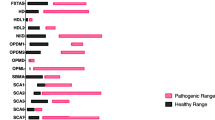Abstract
Haploty** individual full-length transcripts can be important in diagnosis and treatment of certain genetic diseases. One set of diseases, repeat expansions of simple tandem repeat sequences are the cause of over 40 neurological disorders. In many of these conditions, expanding a polymorphic repeat beyond a given threshold has been strongly associated with disease onset and severity. Given that most repeat expansions are inherited in an autosomal dominant pattern, repeat expansion disorders are typically characterized by a heterozygous expansion locus associated with a single haplotype. Precision genetic medicines can be used to selectively target expansion-containing sequences in a haplotype-specific manner.
However, repeat expansion lengths often exceed the capacity of next-generation sequencing (NGS) reads. Therefore, the accurate length and haplotype determination of repeat expansions requires special considerations and requires the development of custom methods. Here we highlight a method for targeted haplotype phasing of the HTT gene, which can be adopted for use with other full-length transcripts and in other repeat expansion disorders.
Access this chapter
Tax calculation will be finalised at checkout
Purchases are for personal use only
Similar content being viewed by others
References
Hnisz D, Abraham BJ, Lee TI, Lau A, Saint-Andre V, Sigova AA, Hoke HA, Young RA (2013) Super-enhancers in the control of cell identity and disease. Cell 155(4):934–947. https://doi.org/10.1016/j.cell.2013.09.053
Corradin O, Saiakhova A, Akhtar-Zaidi B, Myeroff L, Willis J, Cowper Sal-lari R, Lupien M, Markowitz S, Scacheri PC (2014) Combinatorial effects of multiple enhancer variants in linkage disequilibrium dictate levels of gene expression to confer susceptibility to common traits. Genome Res 24(1):1–13. https://doi.org/10.1101/gr.164079.113
Paulson H (2018) Repeat expansion diseases. Handb Clin Neurol 147:105–123. https://doi.org/10.1016/B978-0-444-63233-3.00009-9
Depienne C, Mandel JL (2021) 30 years of repeat expansion disorders: what have we learned and what are the remaining challenges? Am J Hum Genet 108(5):764–785. https://doi.org/10.1016/j.ajhg.2021.03.011
Roberts TC, Langer R, Wood MJA (2020) Advances in oligonucleotide drug delivery. Nat Rev Drug Discov 19(10):673–694. https://doi.org/10.1038/s41573-020-0075-7
Rinaldi C, Wood MJA (2018) Antisense oligonucleotides: the next frontier for treatment of neurological disorders. Nat Rev Neurol 14(1):9–21. https://doi.org/10.1038/nrneurol.2017.148
Crooke ST, Liang XH, Baker BF, Crooke RM (2021) Antisense technology: a review. J Biol Chem 296:100416. https://doi.org/10.1016/j.jbc.2021.100416
Dugger SA, Platt A, Goldstein DB (2018) Drug development in the era of precision medicine. Nat Rev Drug Discov 17(3):183–196. https://doi.org/10.1038/nrd.2017.226
Liu CR, Cheng TH (2015) Allele-selective suppression of mutant genes in polyglutamine diseases. J Neurogenet 29(2–3):41–49. https://doi.org/10.3109/01677063.2015.1073275
Miller JRC, Pfister EL, Liu W, Andre R, Trager U, Kennington LA, Lo K, Dijkstra S, Macdonald D, Ostroff G, Aronin N, Tabrizi SJ (2017) Allele-selective suppression of mutant huntingtin in primary human blood cells. Sci Rep 7:46740. https://doi.org/10.1038/srep46740
Zeitler B, Froelich S, Marlen K, Shivak DA, Yu Q, Li D, Pearl JR, Miller JC, Zhang L, Paschon DE, Hinkley SJ, Ankoudinova I, Lam S, Guschin D, Kopan L, Cherone JM, Nguyen HB, Qiao G, Ataei Y, Mendel MC, Amora R, Surosky R, Laganiere J, Vu BJ, Narayanan A, Sedaghat Y, Tillack K, Thiede C, Gartner A, Kwak S, Bard J, Mrzljak L, Park L, Heikkinen T, Lehtimaki KK, Svedberg MM, Haggkvist J, Tari L, Toth M, Varrone A, Halldin C, Kudwa AE, Ramboz S, Day M, Kondapalli J, Surmeier DJ, Urnov FD, Gregory PD, Rebar EJ, Munoz-Sanjuan I, Zhang HS (2019) Allele-selective transcriptional repression of mutant HTT for the treatment of Huntington’s disease. Nat Med 25(7):1131–1142. https://doi.org/10.1038/s41591-019-0478-3
Wu J, Tang B, Tang Y (2020) Allele-specific genome targeting in the development of precision medicine. Theranostics 10(7):3118–3137. https://doi.org/10.7150/thno.43298
Gagnon KT, Pendergraff HM, Deleavey GF, Swayze EE, Potier P, Randolph J, Roesch EB, Chattopadhyaya J, Damha MJ, Bennett CF, Montaillier C, Lemaitre M, Corey DR (2010) Allele-selective inhibition of mutant huntingtin expression with antisense oligonucleotides targeting the expanded CAG repeat. Biochemistry 49(47):10166–10178. https://doi.org/10.1021/bi101208k
Claassen DO, Corey-Bloom J, Dorsey ER, Edmondson M, Kostyk SK, LeDoux MS, Reilmann R, Rosas HD, Walker F, Wheelock V, Svrzikapa N, Longo KA, Goyal J, Hung S, Panzara MA (2020) Genoty** single nucleotide polymorphisms for allele-selective therapy in Huntington disease. Neurol Genet 6(3):e430. https://doi.org/10.1212/NXG.0000000000000430
Wenger AM, Peluso P, Rowell WJ, Chang PC, Hall RJ, Concepcion GT, Ebler J, Fungtammasan A, Kolesnikov A, Olson ND, Topfer A, Alonge M, Mahmoud M, Qian Y, Chin CS, Phillippy AM, Schatz MC, Myers G, DePristo MA, Ruan J, Marschall T, Sedlazeck FJ, Zook JM, Li H, Koren S, Carroll A, Rank DR, Hunkapiller MW (2019) Accurate circular consensus long-read sequencing improves variant detection and assembly of a human genome. Nat Biotechnol 37(10):1155–1162. https://doi.org/10.1038/s41587-019-0217-9
Payne A, Holmes N, Rakyan V, Loose M (2019) BulkVis: a graphical viewer for Oxford nanopore bulk FAST5 files. Bioinformatics 35(13):2193–2198. https://doi.org/10.1093/bioinformatics/bty841
Svrzikapa N, Longo KA, Prasad N, Boyanapalli R, Brown JM, Dorset D, Yourstone S, Powers J, Levy SE, Morris AJ, Vargeese C, Goyal J (2020) Investigational assay for haplotype phasing of the huntingtin gene. Mol Ther Methods Clin Dev 19:162–173. https://doi.org/10.1016/j.omtm.2020.09.003
Author information
Authors and Affiliations
Corresponding author
Editor information
Editors and Affiliations
Rights and permissions
Copyright information
© 2023 The Author(s), under exclusive license to Springer Science+Business Media, LLC, part of Springer Nature
About this protocol
Cite this protocol
Svrzikapa, N., Boyanapalli, R. (2023). Full-Length Transcript Phasing with Third-Generation Sequencing. In: Peters, B.A., Drmanac, R. (eds) Haploty**. Methods in Molecular Biology, vol 2590. Humana, New York, NY. https://doi.org/10.1007/978-1-0716-2819-5_3
Download citation
DOI: https://doi.org/10.1007/978-1-0716-2819-5_3
Published:
Publisher Name: Humana, New York, NY
Print ISBN: 978-1-0716-2818-8
Online ISBN: 978-1-0716-2819-5
eBook Packages: Springer Protocols




